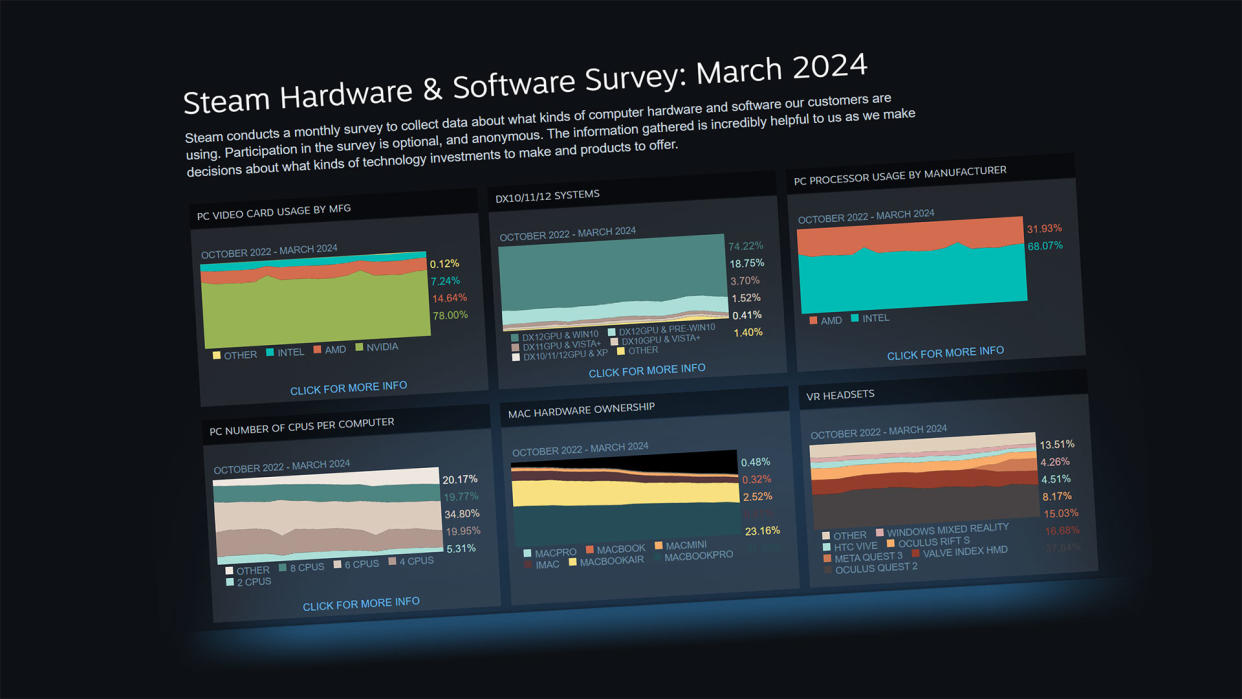AMD RX 7000-series gaming GPUs still mostly MIA in Steam stats — continued gains for Nvidia's RTX 40-series

Valve just posted the latest results of its Steam Hardware Survey, and we have to comment yet again on the surprising lack of any AMD RDNA 3 GPUs other than the RX 7900 XTX. AMD is well-represented among the best graphics cards, offering compelling price for performance, particularly in rasterization games. Yet, its market share continues to decline, and none of the more recent 7000-series GPUs appear on Steam's list.
Looking at the overall breakdown tells a familiar story. The most popular GPUs are at least one generation old, with Nvidia dominating the top ten. Including laptop graphics entries, the highest ranked AMD GPU is the generic "AMD Radeon Graphics" at number 16, with around 2% of surveyed PCs. That's only barely ahead of "Intel Iris Xe Graphics" — integrated graphics used on 10th Gen through 14th Gen Intel mobile processors. AMD's second entry lands at position 28, "AMD Radeon(TM) Graphics." If the Steam Hardware Survey is correct, hardly any gamers use recent AMD GPUs outside of integrated graphics.
Nvidia's RTX 4060 and 4070 GPUs are both in the top ten now, with the RTX 4060 Laptop GPU at #12 and the RTX 4060 Ti — one of our least favorite GPUs of the RTX 40-series — at #15. The RX 7900 XTX only manages to rank at #59 overall, with just over a third of a percentage point. Also missing in action: Every Intel Arc GPU.
Here's a look at how the various generations of hardware stand, from AMD and Nvidia (since, as noted above, Intel is MIA for dedicated GPUs). RTX 30-series reigns as the most popular solution overall, with just over 30% of surveyed PCs — and there's even a slight increase of 0.33% since last month. RTX 40-series now claims second place, with 14% of surveyed PCs and nearly a 1% increase compared to February.
Interestingly, even the RTX 20-series shows a slight 0.08% increase in overall share compared to the previous month, though the GTX 16-series and GTX 10-series both show nearly half a percentage point drop.
AMD's most popular GPU family is the previous generation RDNA 2 RX 6000-series, at 3.66%, followed by the RX 500-series at 2.53%. RX 5000-series and, at least so far, RX 7000-series GPUs haven't done as well. But again, we have to think there are at least a decent number of RX 7900 XT owners these days, not to mention the RX 7800 XT, RX 7700 XT, and RX 7600. Unfortunately, Valve's sampling and tabulation methods remain, as always, obscure.
Another curiosity is that the "Steam Deck GPU" is at position #128 with only a fraction of a percent of the total. Valve itself claims to have sold "multi-millions of units" of the Steam Deck, so the Deck is clearly underrepresented in the survey. Two million out of 130~140 million monthly active users would be more like 1.5% of all PCs, assuming proper random sampling, not the 0.06% we see in the survey, and that calls into question the whole validity of the survey.

There's far less detail to be gleaned from the CPU portion of the survey, which breaks things down by core counts and clock speeds. AMD CPUs dropped nearly 1%, and Intel gained 0.83% compared to last month, though we could only guess how that breaks down into various CPUs.
We know that laptops continue to grow in popularity among many users, and perhaps that's why Intel has gained some ground. AMD's share of the survey peaked at 34.25% in January and then dropped 2% last month, however, so perhaps this is just month-to-month sampling variability.
Overall, there's nothing particularly remarkable with this month's results. Newer Nvidia GPUs are continuing to climb up the charts, but there are plenty of "missing links" that suggest strong bias in how the survey is conducted. Sprinkle liberally with salt, in other words.
The latest JPR market data suggests AMD accounts for 17% of all GPUs, with Intel at 19% and Nvidia at 64%, but that includes integrated graphics. It's too bad that there's no comparable tool showing what sort of hardware gamers are using. Hey, Epic and Tim Sweeney, could you maybe fix that?

